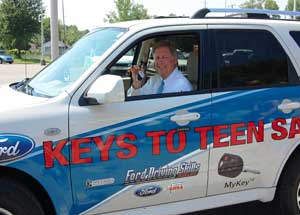Editorial
Front Page - Friday, June 26, 2009
Save lives by encouraging teen driving safety, buckling up
Samara Litvack

Marisa Moyers has a heart-wrenching job. As the pediatric trauma and outreach coordinator at TC Thompson Children’s Hospital, she collects data regarding underage trauma victims and follows up with the hospital’s patients.
“If a child comes in that’s had an ATV accident or a vehicle accident or a bicycle accident, I try to meet with the family and encourage them to make changes if it was some kind of occurrence where they didn’t have on a bike helmet or if they weren’t properly restrained,” she says. “We use discretion because sometimes the injuries are so severe that we don’t want to make the parents feel like we’re blaming them, but we do try to disseminate out the right, correct way to take care of these kids.”
The data she collects goes to the state, which compiles it into statistics for county, state, regional and national statistics.
Moyers’ department also does outreach education through the hospital’s Safe & Sound Injury Prevention Program. Since 80 percent of all pediatric patients are seen in outlying, adult-based facilities before they are brought to the children’s hospital, it is important for TC Thompson to have an ongoing relationship with each of these facilities, in Tennessee, Georgia, North Carolina and Alabama.
“Because they send children to us, we want to make sure that we are there for them as a children’s hospital to assist them with whatever they need in regards to pediatric education to help them be able to take care of that 80 percent of kids who go to their hospital first,” she says.
In addition to this regional partnership, Moyers also facilitates efforts to educate the community on preventing children from becoming trauma victims.
Last year alone, 72 teens were admitted to the emergency department at TC Thompson due to motor vehicle crashes. Fifty percent of those treated were teen drivers. This year is no different; so far 16 children and teens have been treated and one has died due to injuries sustained in a car crash.
This is why when Ford introduced a new innovative technology designed to help parents encourage their teens to drive safer, Safe & Sound was more than happy to partner with them. The two groups held a press event earlier this month explaining the benefits of Ford’s MyKey feature.
Standard for this summer’s 2010 Ford Focus, MyKey allows owners to program a key that can limit the vehicle’s top speed and audio volume. Parents can also program the car to where the radio won’t come on if the seatbelt isn’t buckled. And if the teen chooses to unbuckle during the ride, the radio will go off.
“What teenager doesn’t want the radio to be on?” says Moyer.
And even if the radio is on, parents can program it to play at 45 percent of its volume so it’s not a distraction. They can also program the car at a maximum speed of 80, the agreed-upon speed needed for passing on the interstate.
“All the parents key this stuff in with their key and the child gets the other key,” she says.
Ford has received such rave reviews of the safety feature, it will soon be standard on many other Ford, Lincoln and Mercury models.
In reality, no parent wants to think his or her child will end up in the trauma unit of a pediatric hospital. But, says Moyer, neither did the parents of the 72 children that ended up there last year.
“I just did research on proper car seat usage and seatbelt usage,” she says. “Sixty-seven percent (of children admitted into TC Thompson’s trauma unit) did not have a seatbelt on or were not in a child restraint system.”
These numbers are staggering, considering the quick click of a buckle could have saved these children from life-shattering, and sometimes life-ending, injury. Of the 72 admitted to the trauma unit last year, six died.
“So far this year, it’s over 68 percent that were not restrained or were improperly restrained,” says Moyer. Many parents think they’re doing well by buying car seats, she says, but having them properly installed is what saves children’s lives.
Organizations install car seats for expectant and existing parents year round, and anyone seeking more information can visit www.seatcheck.org and type in their zip code to find a location. Those without Internet access can call Safe & Sound at 423-778-6691.
The bottom line, says Moyer, is that kids are losing their lives for preventable reasons. And all it would take are some quick, preventative measures to change these simple behaviors and make a huge difference – the first of which is leading by example.
“You need to educate your children so much that when they get in the car, they go, ‘Wait. Don’t start the car because I don’t have my seatbelt on yet,’” she says. “The only way you’re going to do that is if you do too.”
|
|